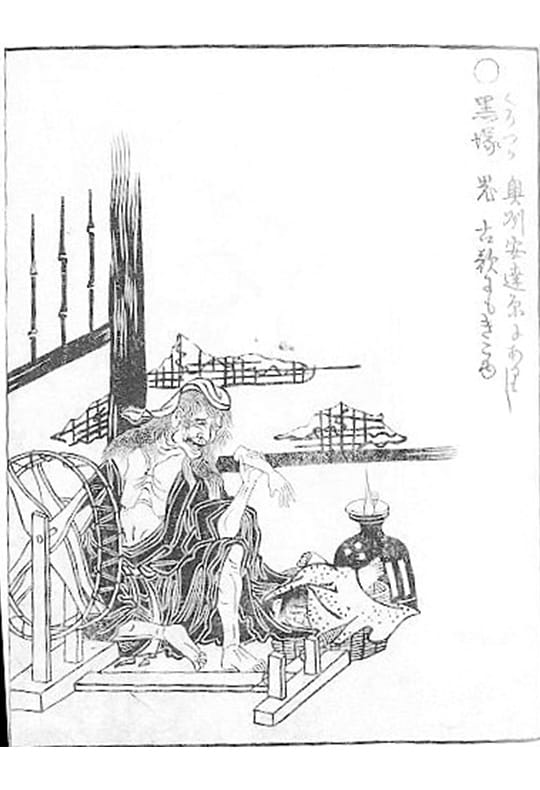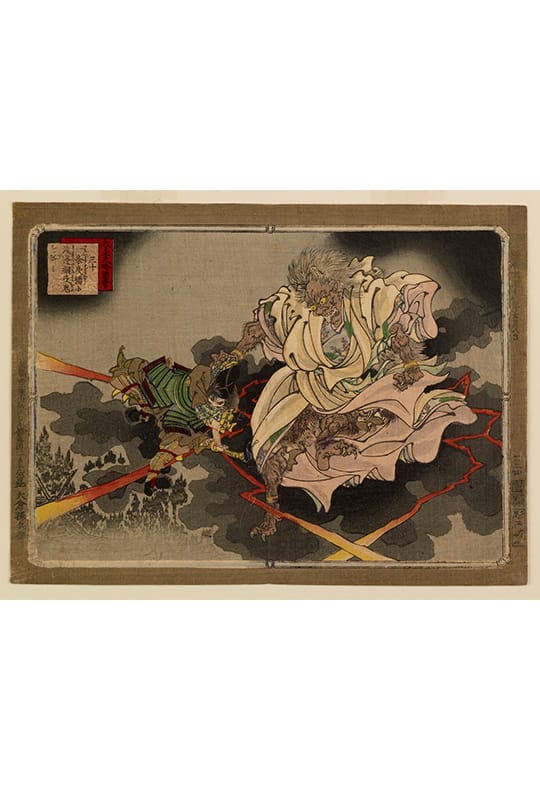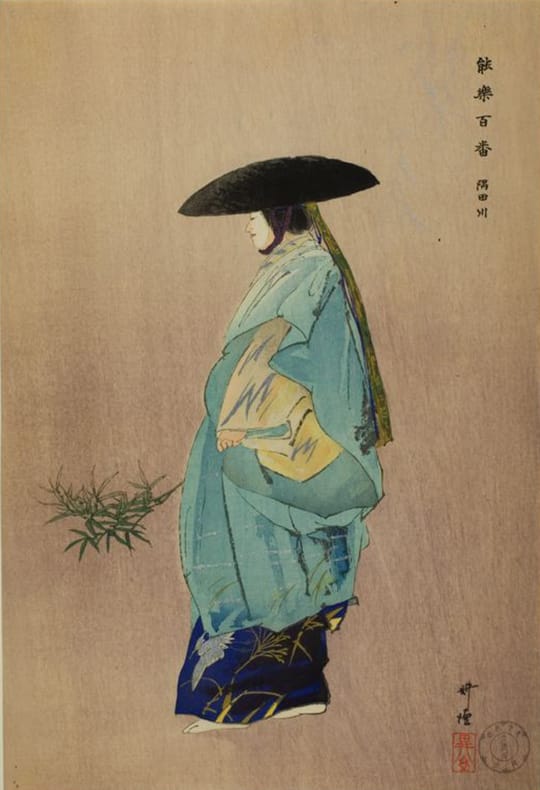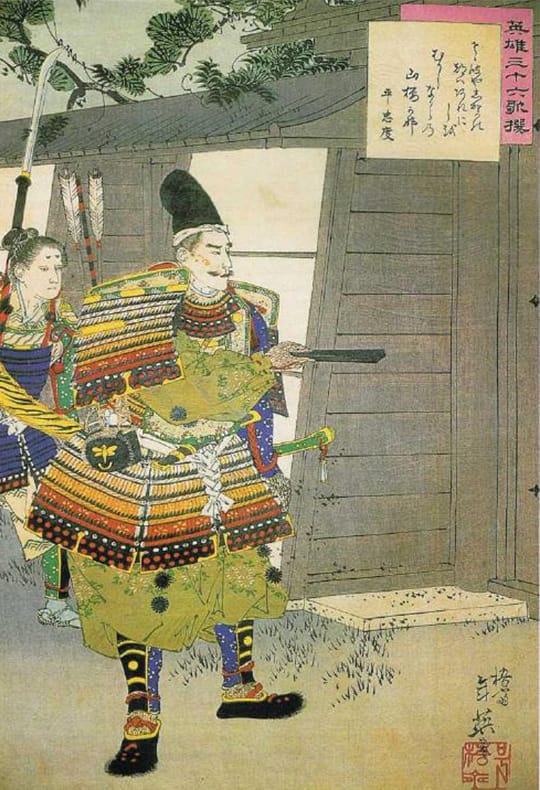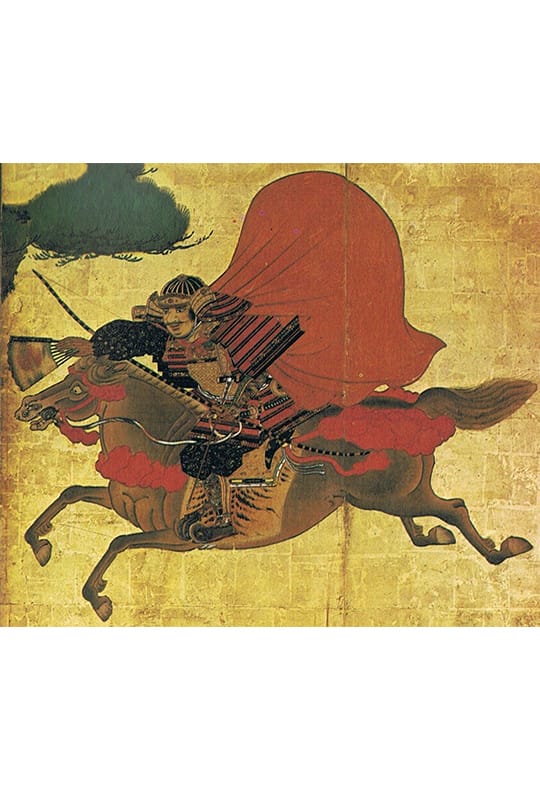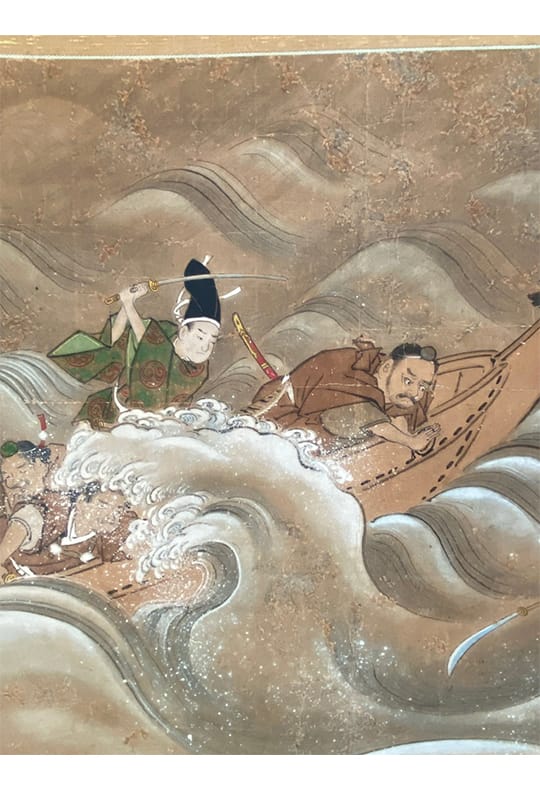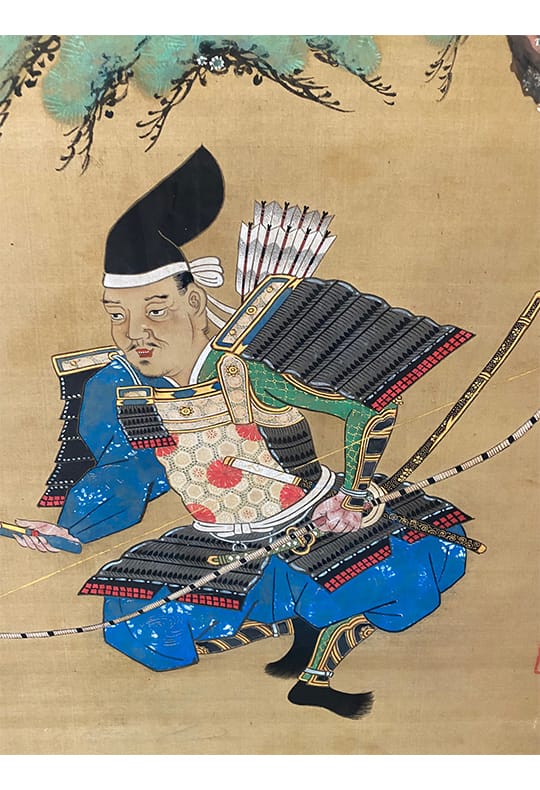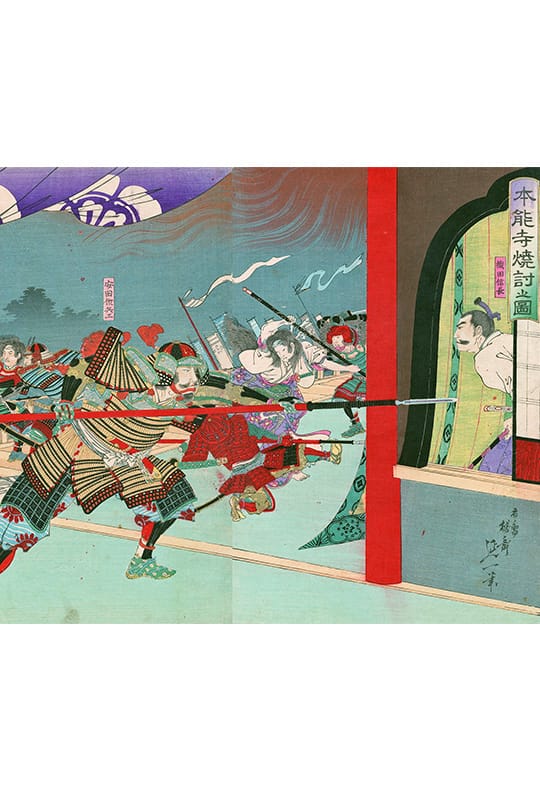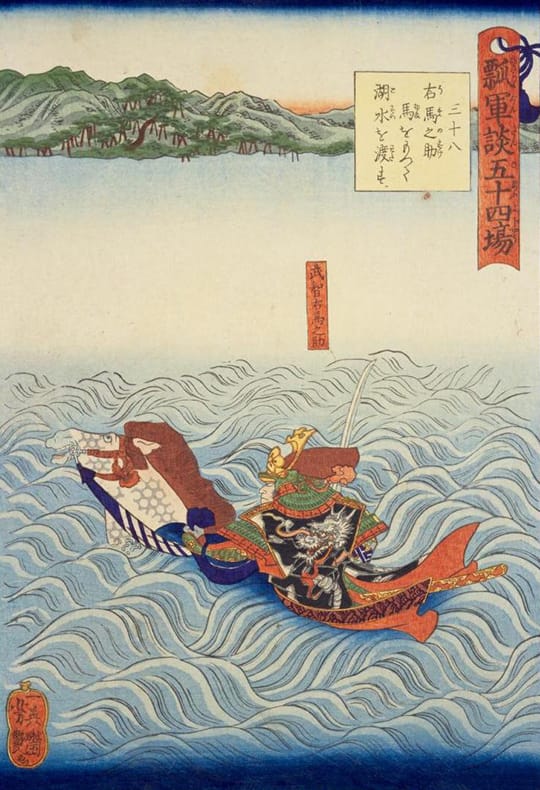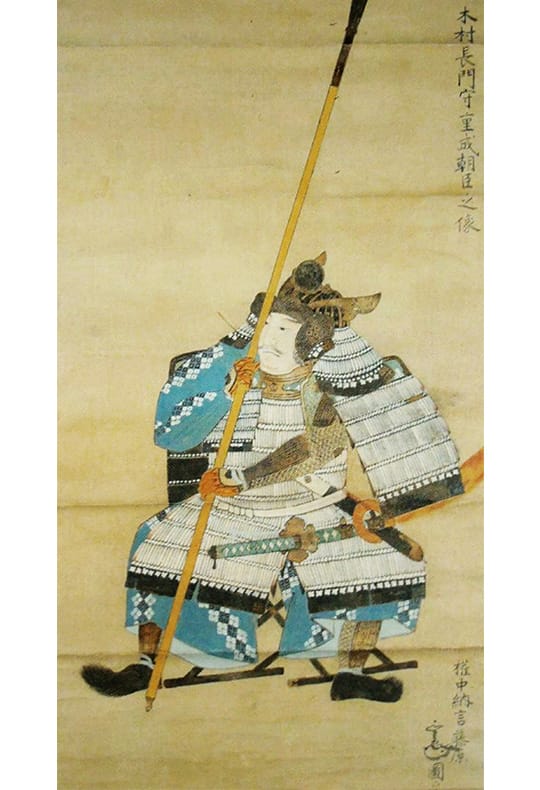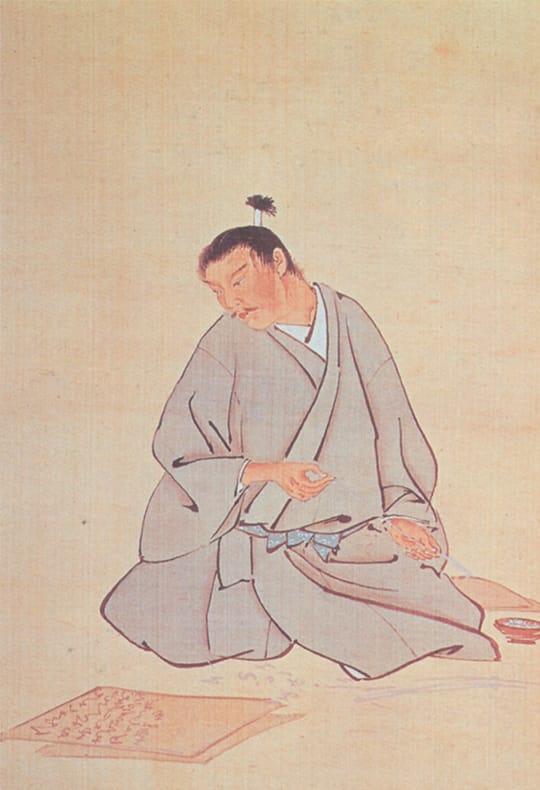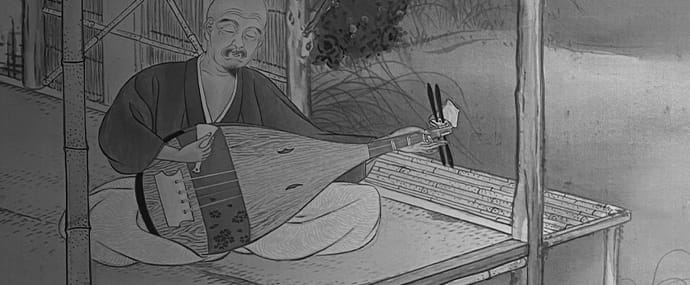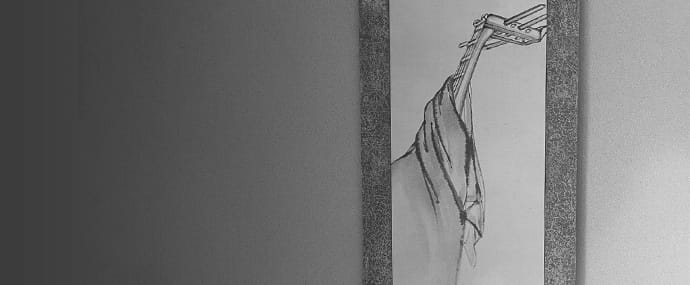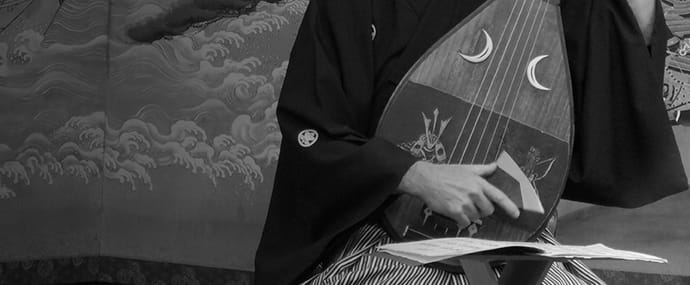Kyoto-search

rashomon
羅生門
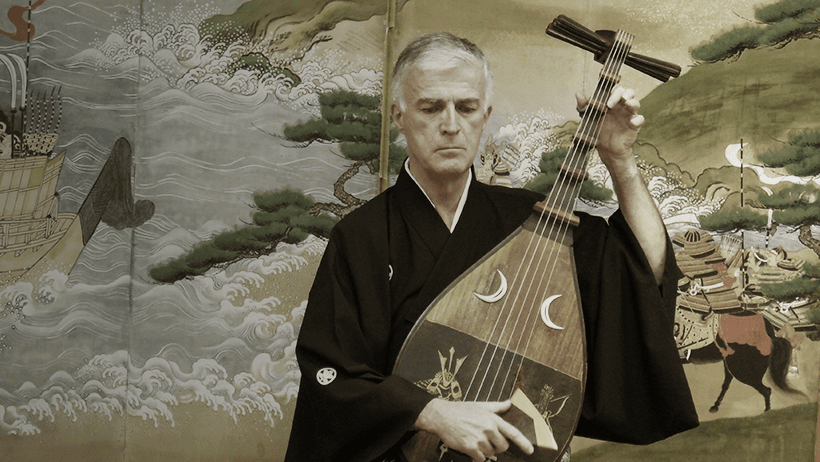
Introduction
Rashōmon is the name of one of the ancient gates to the city of Kyoto. By the Middle Ages, the gate had vanished; nonetheless, legends of this being a dangerous area, haunted by outcasts, criminals and demons, have not faded. In 1915, AKUTAGAWA Ryūnosuke (1892-1927) wrote a short story entitled Rashōmon, the plot of which was based on a collection of medieval stories, the Konjaku monogatari. The plot of a film by the same title, directed by KUROSAWA Akira in 1950, draws upon AKUTAGAWAs story In a Grove (Yabu no naka), and centers on the Rashōmon Gate. (In the movie, the story is told by a character sitting under a huge gate built after the model of the temple Chion’in in Kyoto.) The movie’s theme focuses on the difficulty, or rather the impossibility, of obtaining the truth about an event from conflicting witness accounts.
The protagonist of the biwa piece Rashōmon, WATANABE no Tsuna (953-1024), a warrior from the Heian Period, is famous for his legendary exploits. He was one of the Four Heavenly Guardians in the service of MINAMOTO no Yorimitsu (948-1021). Tsuna’s most famous deed, the severing of a demon’s arm, is recounted in the Tsurugi no maki, the “Sword Chapter” of the yashirobon-version of the Heike Monogatari. According to the Tsurugi no maki, the fight between Tsuna and the demon took place at Ichijō modoribashi, located in the north of the city, this version serving as the source for the stage-play Ichijō modoribashi. The Noh version, however, has shifted the location of their fight to the Rashōmon gate located in the south of the city, this version then becoming far better known than the Tsurugi no maki. In 1866, the playwright KAWATAKE Mokuami (1816-1893) wrote Rashōmon for the Kabuki theatre. He later wrote the Kabuki dance piece, Ibaraki, in which the demon returns to retrieve his severed arm.
The biwa piece Rashōmon derives from the Noh play, but in some aspects, is also related to the above mentioned nagauta piece. The biwa piece, Ibaraki – also included in this study – draws heavily upon the Kabuki version.
Synopsis
MINAMOTO no Raikō holds a cherry blossom viewing party with his retainers in the garden of his estate in Kyoto. As the guests enjoy drink and song, Yasumasa, one of Raikō’s retainers, mentions rumors about the Rashōmon Gate. All listen to his story of a demon haunting the area each evening. One of the higher ranking retainers, WATANABE no Tsuna, angrily contends that this is impossible as creatures such as demons would never dare to abide in the imperial realm. Raikō then suggests that Tsuna confirm the truth of these rumors. Evening has set and it has started to rain. Nevertheless, Tsuna is determined to accomplish his task. He dons his armor and rides towards the Rashōmon Gate. When he arrives, the night is black as pitch, and the rain is pouring. Suddenly, his horse shies and freezes. Tsuna remains calm, jumps down from his horse to leave his placard at the gate attesting to his having examined the area. Just as he is about to place the placard, he is attacked from behind when the demon appears from a cloud to fight with him. When Tsuna manages to cut off the arm of the demon, the latter flees, roaring that he will return in due time to reclaim his arm.
When the battle is over, morning slowly approaches, and the temple bells, which had sounded so confused during the night, ring peacefully, as if to honor the hero, Tsuna.
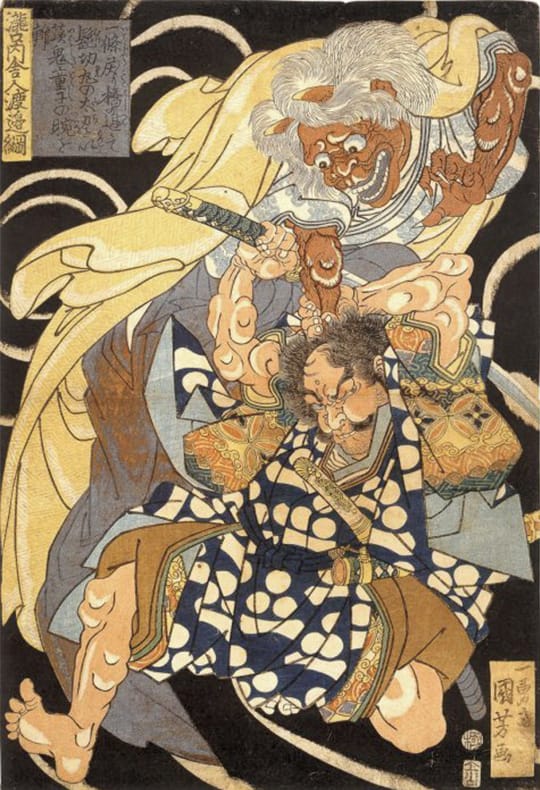
Lyrics
-
1. Purple sleeves spill from carriages Purpurroben lugen aus den Blütenschau-Karossen,
Hanamiguruma no idashiginu 花見車の出し衣
-
2. returning from viewing cherry blossoms in the mist. zarter Dunst verbreitet sich,
kasumi mo niou murasaki ya 霞も匂ふ紫や
-
3. After the haze of the pale blossoms, wo Kirschbaumblüten rosa Wolken bilden.
usukurenai no hanagumori 薄紅の花曇り
-
4. a sudden spring drizzle Eben setzt ein Frühlingsnieseln ein –
yagate moyōsu harusame no やがて催す春雨の
-
5. quietly dampens the avenues of Kyoto die Straßen in der Hauptstadt netzend –
miyako ōji o shimeyaka ni 都大路をしめやかに
-
6. in the quiet evening. welch ein Abendfriede!
furi shizume taru yūbe kana 降りしづめたる夕哉
-
7. But now, listen to my tale of MINAMOTO no Raikō, Nun so lasst mich denn vom Fürsten MINAMOTO no Raikō berichten,
sate MINAMOTO no Raikō wa さて源の頼光は
-
8. the splendid general dem Beschützer unseres hohen Kaiserhauses,
appare chōke no shugo to shite あっぱれ朝家の守護として
-
9. and guard to the Imperial Family, einem Feldherr landesweiten Rufs,
yo ni kikoetsuru ryōshō no 世に聞えつる良将の
-
10. who fought victoriously on Mount Ōe. berühmt als tapfrer Ritter, der am Berge Ōe,
tateshi isao mo Ōeyama 立てし勲も大江山
-
11. Since his conquest of the rebels auf dem Gipfel Senjōgadake
Senjōgadake no zoku domo o 千丈が嶽の賊共を
-
12. at Senjōgadake, die Horde der Rebellen schlug.
uchihoroboshishi konokata wa 討ち滅ぼしゝ以来は
-
13. the land has been peaceful – Dem ganzen Lande brachte er den Frieden;
kuni yasuraka ni tsurugi tachi 国安らかに剣太刀
-
14. swords have no further use. jetzt im Frühling ruht sein Schwert.
yō mo naki mi no haru nakaba 用も無き身の春中旬
-
15. Sadamitsu, Suetake, Tsuna and Kintoki, Sadamitsu, Suetake, Tsuna und auch Kintoki,
Sadamitsu Suetake Tsuna Kintoki 貞光季武綱金時
-
16. his four retainers, all of equal excellence, vier Helden ohnegleichen,
izure mo otoranu rōtō o 何れも劣らぬ郎党を
-
17. now attend his company in his garden warten ihm im Garten auf.
chikaku haberase niwa no mo no 近く侍らせ庭の面の
-
18. where the cherry trees are in full bloom. Sie freuen sich am Blütenzauber,
ima o sakari no sakurabana 今を盛りの桜花
-
19. They delight in viewing the blossoms as they drink. trinken edlen Sake
uchinagame tsutsu sake kumu mo 打眺めつゝ酒酌むも
-
20. How pleased and happy they appear! und genießen ihre Wonnen.
ito tanoshige ni mienikeri いと楽しげに見えにけり
-
21. Yet, even a lengthy day in springtime Selbst an langen Frühlingstagen
sashimo ni nagaki haru no hi mo さしもに永き春の日も
-
22. ends with the setting sun geht im Westen auch einmal die Sonne unter,
itsushika nishi ni iriai no いつしか西に入相の
-
23. and the distant sound of a temple bell. während Glocken in den weiten Himmel hallen.
kane no hibiki ni ōzora no 鐘の響に大空の
-
24. The haze spins into threads of rain Fäden eines aufgerissnen taugetränkten Ärmels ähnlich
kasumi no sode wa hokorobite 霞の袖は綻びて
-
25. that softly dapple the water of the pond, fallen Regen(-Schnüre) in den Teich
kazu yomu hodo no ame no ito 数よむ程の雨の糸
-
26. weaving patterns of figured cloth on its surface. und weben Muster auf dem Wasser.
miike no omo ni aya o ori み池の面に紋を織り
-
27. Cherry blossoms scatter on the shore Leise fallen Kirschbaumblüten
migiwa no sakura horohoro to 汀の桜ほろほろと
-
28. as mandarin ducks doze with auf die Enten nieder,
ukine moyōsu oshidori no 浮寝催す鴛鴦の
-
29. dreams of falling petals. lullen sie in Träume ein.
yume no naka ni zo chirikakaru 夢の中にぞ散りかゝる
-
30. “The voice of the Chōraku Palace bell disappears amidst the flowers, „Vom Palaste Chōraku verklingt die Glocke – dort im Blütenhain.
Chōraku no shōsei kagai ni tsuki 長楽ノ鐘声花外ニ尽キ
-
31. the green willows by the Dragon Pond darken in the rain… Dunkel wird der Weiden Grün im Regen – dort beim Drachenteich.”
ryūchi no ryūshoku uchū ni ”fukashi” 龍池ノ柳色雨中ニ深シ
-
32. an appropriate Chinese couplet Raikō sang Fürst Raikō singt mit klarer Stimme
Raikō koe mo hogaraka ni 頼光声も朗らかに
-
33. in a brilliant voice with pleasing melodies. diese wundervolle Weise.
fushi omoshiroku ginjikeri ふし面白く吟じけり
-
34. At this time Yasumasa, another retainer, said: Da beginnt auf einmal Yasumasa zu erzählen:
kono toki Yasumasa mōsu yō 此時保昌申すやう
-
35. “There has been a strange and recent rumor. „Neuerdings geschehen sonderbare Dinge:
chikagoro fushigi no koto koso sōrae 近頃不思議の事こそ候へ
-
36. of a demon living in the Rashōmon Gate on Kujō. In der Neunten Strasse soll beim Tore Rashōmon ein Dämon hausen,
Kujō no Rashōmon ni oni sumite 九条の羅生門に鬼栖みて
-
37. No person dares to approach once night has fallen – deshalb wagt sich in der Dunkelheit kein Mensch dorthin.
kurureba hito no tōranu yoshi 暮るれば人の通らぬ由
-
38. this is what people talk about.” So redet in der Stadt das Volk.”
yo ni moppara no torizata to 世に専らの取沙汰と
-
39. As he recounted this, Bei diesen Worten
katariizureba ichidō wa 語り出づれば一同は
-
40. all drew near with breathless attention. rücken alle atemlos an seine Seite.
katazu o nonde tsumeyosetari 固唾を呑んで詰め寄せたり
-
41. Tsuna, hearing this, stepped forward and said, Tsuna hört’s und drängt sich vor:
Tsuna wa kiku yori susumiide 綱は聞くより進み出で
-
42. “The winds and waves of the Four Oceans are calm. „Auf allen Meeren sind die Winde und die Wellen friedlich,
shikai namikaze shizuka nite 四海波風静かにて
-
43. Glorious is the virtue of the Emperor. Herrlich ist des Kaisers Tugend.
miitsu kagayaku kimi ga yo no 御稜威輝く君が代の
-
44. I cannot understand how a demon could haunt Wie soll da beim Tor im Süden unserer Hauptstadt
shikamo miyako no Nanmon ni しかも都の南門に
-
45. the Southern gate of the Capital. sich ein Dämon niederlassen können?
kijin no sumu to wa kokoroezu 鬼神のすむとは心得ず
-
46. It is reckless of you to say so.” Hör‘ doch auf, uns solche Sachen zu erzählen.“
sokotsu ni mono na notamai so to 粗忽に物な宣ひそと
-
47. Hearing this, Yasumasa rebuked Tsuna, Yasumasa spürt den Tadel:
ieba Yasumasa kikitogame 云へば保昌聞き咎め
-
48. “Perhaps I have misunderstood you. „Ich verstehe nicht, wie du es meinst.
ko wa kokoroenu ōse kana こは心得ぬ仰せ哉
-
49. If you have any such doubts, Doch wenn du zweifelst,
sa made fushin to oboshinaba さまで不審とおぼしなば
-
50. please, go and see for yourself.” geh doch hin und prüfe selbst.“
yuki te goranji sōrae to 行きて御覧じ候へと
-
51. With these words, Tsuna’s passions rose Herausgefordert wächst nun Tsunas Heldenmut,
iwarete Tsuna wa hayario no 言はれて綱は逸り雄の
-
52. and it appeared impossible to restrain him er ist nicht mehr zu halten,
kokoro no koma no kizuna o ba 心の駒の絆をば
-
53. from mounting his horse. will doch gleich will sein Pferd besteigen.
hikikaesu beki keshiki naku 引返すべき気色なく
-
54. “It galls me to think „Glaubst du denn,
soregashi okushi mairanu to 某臆し参らぬと
-
55. that you should find me a coward. ich hätte Angst vor jenem Ort.
obosaren koso shingai nare おぼされんこそ心外なれ
-
56. I shall depart immediately Ich geh jetzt hin
kore yori sugu ni hasemukai 是より直に馳せ向ひ
-
57. to see whether it is true or not. und sehe nach, was Wahrheit und was Lüge ist,
makoto itsuwari mitodokete 真偽見届けて
-
58. I will leave a placard there as proof of my actions.” beweise meinen Augenschein mit einer angeschlagnen Tafel”
shirushi no fuda o tatekon to 標の札を建て来んと
-
59. He said this in the highest of spirits. dies verkündet er mit stolzem Sinn.
isami o nashite mōshikeri 勇みをなして申しけり
-
60. Raikō nodded in approval. Fürst Raikō nickt verständig:
Raikō ge ni mo to unazukite 頼光実にもとうなづきて
-
61. “For the honor of the Emperor and of the military houses, „Wahrlich um des Kaisers und der Ritter Ehre willen,
kimi no ontame bumon no tame 君の御為武門の為
-
62. go and ascertain the truth. ziehe hin und schaffe uns Gewissheit.
tashika ni mitodoke sōrae to 確に見届け候へと
-
63. Take this placard and this noble sword.” Hier, die Tafel nimm sie und nimm auch das edle Schwert.
shirushi no fuda to onhakase “標の札と御佩刀
-
64. Profoundly moved, he presented these to Tsuna. Davon ist Tsuna tief bewegt.
gyokan no amari tabikereba 御感の余り賜びければ
-
65. Having received the greatest honor of the time, Von Ehrgefühl erfüllt
toki no menmoku uketamawari 時の面目承はり
-
66. Tsuna left the manor house. entfernt er sich vom Herrensitz.
Tsuna wa yakata o idete yuku 綱は館を出でゝ行く
-
67. Time had passed, night had fallen, Es rückt die Stunde vor,
sude ni sono yo mo shoya sugite 既に其夜も初夜過ぎて
-
68. and with the sad drip of the rain from the eaves, von allen Traufen fallen Tropfen,
nokiba o meguru tamamizu no 檐端をめぐる玉水の
-
69. it deepened even more. klatschen in die Nacht hinein.
oto sugosugo to fukewatari 音すごすごと更け渡り
-
70. The cries of the frogs in the pond Die Frösche quaken in den Teichen,
ike no kawazu no naku koe ni 池の蛙の鳴く声に
-
71. were drowned in the splatters of the increasing rain. während es in Strömen gießt.
furimasari yuku ame no ashi 降りまさり行く雨の脚
-
72. Without a moment’s delay, Doch Tsuna gönnt sich keinen Aufschub,
Tsuna wa shibashi mo yūyo sezu 綱は暫しも猶予せず
-
73. Tsuna ties up his robes schürzt sein dunkelblaues Kleid
kachin no hitatare musubiage 褐の直垂結びあげ
-
74. and throws the ancient family armor und wirft sich eilig
ie jūdai no yoroi o ba 家重代の鎧をば
-
75. on his shoulders. in die Rüstung seiner Väter.
zakku to kata ni nagekakete ざっくと肩に投げかけて
-
76. With his imposing sword Schnell hat er das lange Schwert gegürtet,
ikamono zukuri no ōdachi ni 厳物作りの大太刀に
-
77. and the newly presented blade at his waist, welches er empfangen hatte,
tabitaru tsurugi hakisoete 賜びたる剣佩き添へて
-
78. he saddles a big black horse, tall as a man richtet sich die Bügel,
yaki ni mo amaru kurogoma ni 八寸にも余る黒駒に
-
79. and mounts, steigt aufs große schwarze Pferd
shizugura okase torinotte 下鞍置かせ取り乗って
-
80. leaving for Kujō street. und trabt entschlossen Richtung Kujō.
Kujō omote ni utte izu 九条表に打って出づ
-
81. Through the impenetrable darkness Finster ist die Nacht,
ayame mo wakanu shin no yami 黒白もわかぬ真の闇
-
82. a fetid wind blows es fegt ein beißend scharfer Wind,
kaze namagusaku fukiochite 風腥く吹き落ちて
-
83. as the driving rain strikes his face. der Regen peitscht ihm ins Gesicht.
shinotsuku ame wa omote o ba 篠突く雨は面をば
-
84. From the distant depths of the night Die Nacht wird tief,
itaku mo utsu ya ushimitsu no いたくも打つや丑三の
-
85. comes the muddled sound of temple bells. und alle Tempelglocken schlagen wirr.
kane mo midarete hibiki kuru 鐘も乱れて響き来る
-
86. Then, how strange! The excellent horse Auf einmal, sonderbar,
ara fushigi ya ichimotsu no あら不思議や逸物の
-
87. takes fright and refusing to advance, sein Pferd wird scheu, bleibt zitternd stehen,
koma mo obiete susumiezu 駒もおびえて進み得ず
-
88. stands and trembles. rührt sich nicht vom Fleck.
miburui shite zo tattarikeru 身慄してぞ立ったりける
-
89. “Here it is!” said Tsuna, and vaulted from the saddle ”Hier bin ich ja”, sagt Tsuna, und er steigt vom Pferd.
sate wa to kura yori tonde ori さてはと鞍より飛んで下り
-
90. to fix the placard Beim großen Tore Rashōmon
Rashōmon no ishidan ni 羅生門の石壇に
-
91. on the stone platform of the Rashōmon gate. schlägt er nun die Tafel an.
shirushi no fuda o tate okite 標の札を立て置きて
-
92. He was just about to return, Dann dreht er sich und schickt sich an zurückzukehren.
kaeran to suru ushiro yori 帰らんとする後より
-
93. when from behind, an ill-spawned creature of terrible strength Doch da spürt er hinten eine Kraft,
henge mashō ka kongōriki 変化魔生か金剛力
-
94. seized the neck guard of his helmet. die an den Nackenschutz des Helmes greift.
shikoro o muzu to hittsukamu 錣をむづと引っつかむ
-
95. Black clouds roiled above Von schwarzen Wolken eingehüllt,
orishimo kurokumo makiokori 折しも黒雲巻き起り
-
96. and in the flickering lightning von Blitzen grell beleuchtet
hirameki wataru inazuma ni 閃き渡る稲妻に
-
97. appeared the figure of a demon. zeigt sich ihm ein Dämon.
kijin no sugata arawaretari 鬼神の姿現はれたり
-
98. Tsuna took not the least fright Tsuna aber fürchtet nichts,
Tsuna wa sukoshi mo odorokazu 綱は少しも驚かず
-
99. and held his sword aloft. er schwingt mit Kraft und Macht sein Schwert.
tachi makkō ni furikazashi 太刀真向に振り翳し
-
100. “The rich lands of the imperial realm „Das Land mit allem, was gedeiht, gehört dem Kaiser,
tsuchi mo ki mo mina ōkimi no kuni naru ni 土も木も皆大君の国なるに
-
101. are desecrated by your presence! du jedoch bringst nichts als Schmutz ins Reich, du Teufel.
ōchi o kegasu keshō mono 王地を汚す化生もの
-
102. Do not move!” shouted Tsuna Rühr dich nicht !“ ruft er
soko ugoku na to yobawatte そこ動くなと呼はって
-
103. as he sliced at the demon with his sword. und schlägt gar heftig auf den Dämon ein.
mijin ni nare to kiri kakaru 微塵になれと切りかゝる
-
104. The demon snarled and, baring his fangs, Dieser aber fletscht die Hauer, knurrt
kijin wa kiba o kaminarashi 鬼神は牙を噛み鳴らし
-
105. seized his iron staff, und greift zum Eisenprügel,
mottaru tetsujō torinobete 持ったる鉄杖取り延べて
-
106. and whipped it about in all directions. schwingt ihn kreuz und quer.
jūō mujin ni uchifuruu 縦横無尽に打振ふ
-
107. Tsuna lightly leapt, never staying in one spot. Mit Sprüngen hin und her weicht Tsuna aus,
hirari hirari to tobichigai ひらりひらりと飛び違い
-
108. Aiming at the demon’s hand, versucht, den Unterarm des Dämons abzuschlagen.
tsutto temoto ni tsukeitte つっと手元に付け入って
-
109. he gave a mighty stroke. Kraftvoll ist im rechten Augenblick ein gut geführter Streich,
ikioi konde utsu tachi ni 勢ひこんで打つ太刀に
-
110. The demon lost his arm mit dem es ihm gelingt, die Hand vom Arm des Teufels abzutrennen.
kijin wa kaina o kiriotosare 鬼神は腕を切り落され
-
111. and fled to the safety of the black clouds. Unverzüglich springt der Dämon in die schwarzen Wolken.
haya kurokumo ni tobinotte はや黒雲に飛び乗って
-
112. “In due time, I shall take back what is mine,“ “Warte nur, ich komme mir sie wieder holen!“
jisetsu o matte toru beshi to 時節を待って取るべしと
-
113. he thundered. schreit er grässlich,
sakebu koe sae monosugoku 叫ぶ声さへ物凄く
-
114. In a blaze of light, he flew directly flieht zum Berge Atago
Atago no kata e hitosuji no 愛宕の方へ一条の
-
115. towards Mount Atago. im Flammengleiß entschwindend.
kaen to narite hikari yuku 火焔となりて光り行く
-
116. The dawn soon broke Bald schon ist es Dämmerstunde,
yagate kikoyuru akatsuki no やがて聞ゆる暁の
-
117. with the bell’s faint sound. friedlich läuten Tempelglocken nah und fern.
kane morotomo ni honobono to 鐘諸共にほのぼのと
-
118. The night storm has faded Der Sturm der Nacht hat sich gelegt,
akeyuku sora ni yoarashi mo 明け行く空に夜嵐も
-
119. and in the rising sun, die Morgensonne leuchtet schon.
itsushika yamite asahiko no いつしか止みて旭子の
-
120. how clear the Rashōmon gate! Wie strahlt doch Rashōmon in diesem frühen Licht.
hikari sayakeki Rashōmon 光りさやけき羅生門
-
121. More fearsome than any demon Mehr Furcht gebietend als ein Dämon
onigami yori mo osoroshiki 鬼神よりも恐ろしき
-
122. Tsuna’s fame has grown, erntet Tsuna Ruhm und Ehren,
Tsuna wa na o koso agenikere 綱は名をこそあげにけれ
-
123. Tsuna’s fame has grown. erntet Tsuna Ruhm und Ehren.
Tsuna wa na o koso agenikere 綱は名をこそあげにけれ
Notes
1. Purple sleeves spill from carriages… These carriages are Palace vehicles pulled by black bulls. The purple sleeves seen trailing from beneath hanging screen indicates the presence of court ladies who are also participating in this elegant cherry blossom viewing. 7. MINAMOTO no Raikō… In spite of this general, whose name is also read as Yorimitsu, being a historic figure (944-1021), he figures in several legends. The most famous of the legends is his duel with the demon Shutendōji on Mt Ōe. Shutendōji’s main (demon-) retainer is Ibaraki, the same demon to appear at the end of this ballad. 12. Senjōgadake… This is the name of the highest peak (833 m) in the Mt Ōe region on the border of Tango and Tamba (Northern and Central Part of Kyoto Pref.) 15. Sadamitsu, Suetake, Tsuna and Kintoki… These four retainers are as famous as Raikō, and known as the “The Four Heavenly Guardians of Raikō”. 22./23. (…) ends with the setting sun and the distant sound of a temple bell… The sounding of a temple bell at sunset is a poetic image used to evoke a distinct atmosphere. Here, it leads to a turn in the story. Rain begins to fall and it is getting progressively darker. In two other passages of the ballad, the sound of temple bells marks the supernatural: the first being when Tsuna nears Rashōmon and the demon, and the bells ring in disorder (line 85); the second being the end, after Tsuna had fights with the demon, the temple bells ring peacefully (line 117). 28. mandarin ducks… These ducks are usually symbols of marital love, but here they are used to represent the elegant setting of a luxurious Chinese style garden in Kyoto. 30./31… This poem, called shigin, is written in the Chinese Style. The poem is taken from the Wakanrōeishū, the “Anthology of Japanese and Chinese Poems for Recitation” (compiled by FUJIWARA Kintō 966-1041) and from the Noh play “Miidera”. Chōraku is the Palace built by the Tang Emperor Gao-zu (618-626) in the Capital Chang’an, and the Dragon (-shaped) pond was in the Garden of the Leisure-Palace built by Emperor Xuan-zong (713-741) in Xi’an. 34. Yasumasa… HIRAI Yasumasa (his full name) is not a member of the “Four Heavenly Guardians,” although he seems to be quite close to his lord. In the Noh play Tsuchigumo, he is called a “Single Warrior” and is the hero fighting the spider-demon who had attacked MINAMOTO no Raikō. 36. Rashōmon…The original name of this gate is “Rajōmon”. It is said to have been destroyed in 816, then rebuilt, but yet again destroyed in 980. The gate marked the city limits, commonly referred to as rakuchū (within Kyoto) and rakugai (out of Kyoto). The immense and still extant temple of Tōji had to protect the gate on its east side and, a now defunct temple, Saiji had the same function on the west side. (For Kujō, see note for line 80) 41. WATANABE no Tsuna… The protagonist is a historical person (953-1025). 67. Time had passed. Night had fallen … In ancient Japan, night was divided into three parts, shoya being the first third, or early evening. 80 Kujō…Kujō means the Ninth Street. Kyoto has a grid structure of parallel avenues and streets. The streets running from east to west are counted from One to Nine (beginning in the north). Therefore the Ninth Street is in the southern part of the Capital. 84. From the distant depths of the night …The Japanese text has ushimitsu, which refers to the time between 2:00 to 2:30 am. 97. demon… The name of the demon, Ibaraki, is not mentioned here. In the sequel ballad Ibaraki, the demon introduces himself. (Concerning Ibaraki, see note to line 7.) 114./115. Mount Atago.… Mount Atago (924m) is northwest of Kyoto. The shrine on the mountain houses the God of Fire. Even today, worshipers pray for protection from fire, throw small ceramic saucers to prevent malign influence, and return with a fire-prevention amulet to be enshrined in the kitchen.

Music Notes
The musical setting for this ballad is beautiful and equally nuanced. Each of the different scenes and the changing moods in the dialogues is carefully reflected in the vocal and instrumental parts.
The climactic scene of Tsuna fighting the demon is illustrated by two large interludes. The first, after line 103, is the commonly used virtuoso pattern chō no san. Used in nearly every ballad for a splashy dramatic effect, it serves to stimulate the imagination as it raises images of Tsuna forcefully wielding his sword.
After line 106, another equally dramatic interlude, chō no nana, is required. It is commonly preceded by a small prelude of a few strokes known as aun. Despite its brevity, biwa performers dread the pattern aun due to an unnatural use of the plectrum. When placed in the context of lines 104 through 106, however, its awkward movements make sense:The demon snarled and baring its fangs / seized his iron staff / and whipped it about in all directions.

Chō no nana is technically most challenging: one passage in the middle might be notated falsely because in the way it is written it is almost unplayable, and another passage in the last section requires a lot of strength in the middle finger of the left hand to produce the proper pitch. These problems might be the reason why this interlude is seldom played and why even YAMAZAKI Kyokusui omitted it in her famous recording of 1979: YAMAZAKI moves from line 103 (followed by chō no san) directly to line 107.
Nevertheless, from the viewpoint of dramaturgy, this shortening actually secures the arrival of the ballad’s climax in a more comprehensible way than struggling with the challenges of aun and chō no nana. Nowadays, most performers opt for the same truncated version to ensure a successful performance.
